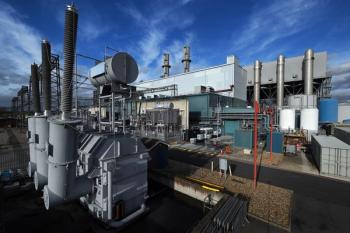
Duke Energy to reconfigure Asheville power plant
Duke Energy announced recently that the company was no longer planning to build a 45-mile transmission line and substation in Campobello when it builds two new natural gas plant in the Asheville area. Under the revised plan, the company will replace its coal plant in Asheville with two smaller gas units rather than one large plant.
The new plan includes a two-phased approach to reconfigure the Asheville power plant. Officials said they created a new plan after getting community feedback on the company’s original plan to connect one new large electrical station to the substation in South Carolina via a high voltage transmission line through the mountains of North and South Carolina.
Duke Energy plans retiring of the coal units as scheduled by 2020. The company plans to build two highly efficient natural gas combined-cycle 280MW units on the site, with the option for a simple-cycle 190MW unit in 2023 or later, depending on the success of the company and community’s efforts to reduce daily and peak power demand.
New units will be designed to operate with a dual fuel source so oil can serve as emergency backup in the event of an interruption of the natural gas supply.
The company also plans a utility-scale solar power plant on the site.
The new natural gas units are estimated to have significantly lower environmental impacts than the existing coal plant. Sulfur dioxide will be reduced by an estimated 90 to 95 percent, nitrogen oxide will be reduced by an estimated 35 percent, and mercury will be eliminated, according to the company.
Water withdrawals will be reduced by an estimated 97 percent, and water discharges are expected to be reduced by an estimated 50 percent.
Carbon dioxide emissions are likely to be reduced by about 60 percent, on a per-megawatt-hour basis. Duke plans to file for a Certificate for Public Convenience and Necessity with the North Carolina Utilities Commission for the new gas units in January 2016.
Robert Sipes, Duke Energy’s general manager of delivery operations for the Western Carolinas said the region’s economy is booming with 14 new hotels, two national craft breweries and more than $1 billion in new industrial investment, in five years. "Our challenge now is to support that growth while working with the community to reduce the region’s peak power and ongoing demand through much more participation in energy efficiency programs, demand response and renewable energy and related technologies.”
Newsletter
Power your knowledge with the latest in turbine technology, engineering advances, and energy solutions—subscribe to Turbomachinery International today.




